Ying and yang food in the macrobiotic diet
More than a diet or to lose weight, we could say that the macrobiotic diet it is characterized more by being a philosophy of life, being based on Chinese Medicine and Zen Buddhism, in which health is synonymous with equilibrium between two principles: yin (feminine, cold and dark) and yang ( masculine, hot and luminous), which are present in all nature.
Therefore, according to the philosophy of the macrobiotic diet, there is an absence of disease when the principles of yin and yang are in perfect balance, achieved by a balanced diet and the pursuit of a relaxed life, based on spiritual serenity, in relaxation and in the practice of meditation. Defend, therefore, that there is an absolute relationship between our mood and food.

The balance between yin and yang foods
The food or macrobiotic diet classifies different foods into two main categories: yin (foods considered as passive) and yang (active foods).
As indicated in the previous lines, there must be a certain balance between these two food groups, as an objective when it comes to achieving both physical and spiritual well-being, and ultimately health itself.
We must differentiate not only the yin and yang foods, but those that tend not to be so healthy by containing an excess of yin or an excess of yang.
With all this, a balanced diet should consist of 50% of cereals, 25% of vegetables, 10% of legumes and 5% of fruits, seafood and soups.
Food yin
We find foods such as fruits, leafy vegetables, seeds, malt, tofu, tempe, natural fruit and vegetable juices and jam without sugar.
However, as a counterpart we find those foods that have an excess of yin, such as sugar, sweets and cakes, alcohol, tea, coffee and spices.
Yang food
They are foods such as whole grains, pasta and whole grain meals, root vegetables, legumes, fish and seafood, fresh cheese, salt, shoyu and miso.
Among the foods with excess yang, we can mention meats, poultry, hard and salty cheeses and eggs.
Image | suavehouse113 This article is published for informational purposes only. You can not and should not replace the consultation with a Nutritionist. We advise you to consult your trusted Nutritionist.


